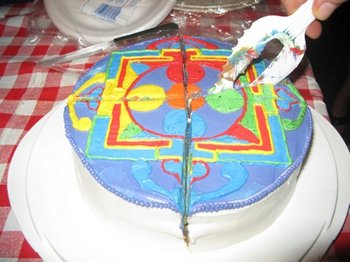Reincarnation as a theme does not lend itself easily to discussion or literary treatment. So where does one turn in our culture for discourse on that difficult philosophical subject? Many, if not most, of the Buddhists I know are perfectly willing to go in for meditation and compassion, but not so eager to take the leap to a belief in reincarnation. Even prominent modern Buddhists teachers from traditional lineages–I am thinking, for example, of Chogyam Trungpa, Suzuki, or Thich Nhat Hanh–rarely address directly the question of reincarnation in their books and published lectures (though, I’m sure I’ve missed something in this regard). Not to return to Vince Horn’s discussion from last week of the so-called secularization of Buddhism, but isn’t this bogeyman quality of the discussion of reincarnation part of this so-called secularization? Of course, belief per se is not necessarily required in Buddhism. It’s not like if you don’t believe in God–or in Amitabha or in Tara–then you’re out. And perhaps reincarnation is a little too metaphysical for people at a point in life where what they really want and need is merely a little mind-watching and self-reflection, clarity and calm. Still, reincarnation is cool. And interesting. And important. So where’s the discussion?
At the very least, the idea of karmic formulations makes sense to me. The idea that our unresolved karma lives on after the death of this particular body makes sense to me. I once heard (or read) the following story about reincarnation…
An old Jewish woman in New York has been studying Buddhism and practicing meditation for many years. As she nears the end of her life, she asks her teacher for the final instructions on achieving Buddhahood. Her teacher says, “Aw, don’t bother with that. It’s too hard. Why don’t you just take a vacation?” But the woman persists, saying, “No, I really want the good stuff now, the secret practices.” But her teacher says, “Don’t worry about that stuff. It’s winter, it’s cold. Why don’t you just hop on a plane and head for a sunny beach?” The student, though, is undeterred. She says, “Come on, I’ve worked so hard. I’ve come this far. I’ve emptied out pretty much everything and resolved most if not all of my karma. Please give me the final teachings.” The lama, though, says yet again, “You might want to just take a vacation to Florida instead.” Finally, the woman relents, sayings, “You know, I have always wanted to go to Florida.” And at that moment she dies and is reincarnated as a bird migrating south for the winter.
If that story doesn’t do it for you, there’s always science fiction. Ken Grimwood‘s book Replay is one of my favorite fun philosophical reads…
It’s become the family book. I’ve read it. My girlfriend has read it. My girlfriend’s mother and sister and brother-in-law have all read it. We talk about it on family vacation. Everyone else now has to read it. It’s the kind of book you pass around. Because it’s fun. And it’s interesting. And it’s about reincarnation!
Well, it’s about a guy getting stuck in a time-loop. Every time he has a heart attack at age 43, he returns to the body of his 18 year-old self, full of the memories of his previous lives, or at least, full of the memories of his previous turns as this particular guy, Jeff Winston, a radio journalist. So the plot is a little less The Transmigration of Timothy Archer (Philip K. Dick’s novel about reincarnation) and a little more Groundhog Day (the Ramis movie in which Bill Murray repeats a single day over and over). But still, it makes you think.
There are the obvious messages in the book: live every day of your life to the fullest; understand that not everything is under our control, but that there are things we can and do and should control; and lastly, choices must be made, in other words, you have to be somebody, so you may as well just be who you are!
For me, reading the book was an effective way of looking at my own intentions dead-on. (My Replay dream would be to build and run my own enormous school, just like Tolstoy, a study center complete with meditation and poetry and philosophy instruction.) There is something in the story that makes the reader turn inward and consider his own life goals, his own karma. The perennial questions rise to the surface: Why am I here? What am I doing with this precious life? How am I helping or connecting to others? What does it all mean?
While the novel may not reveal any ultimate metaphysical truths about reincarnation, it does help one look squarely at one’s karma–whatever it may be–and inspire one to do something about it. Burn it up, as they say, tackle that karma, and burn it up.

